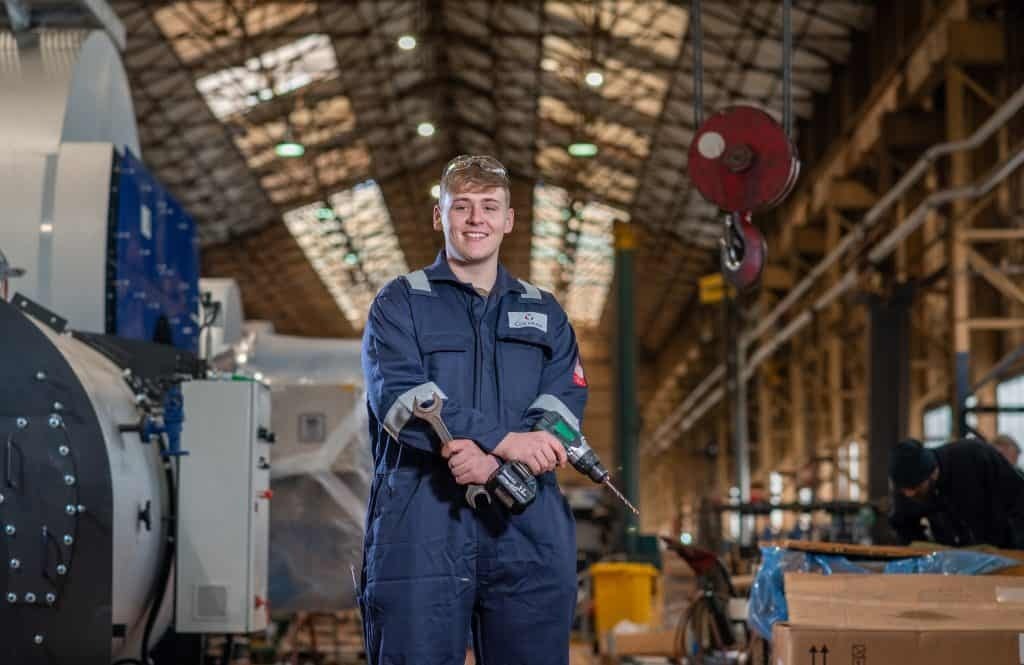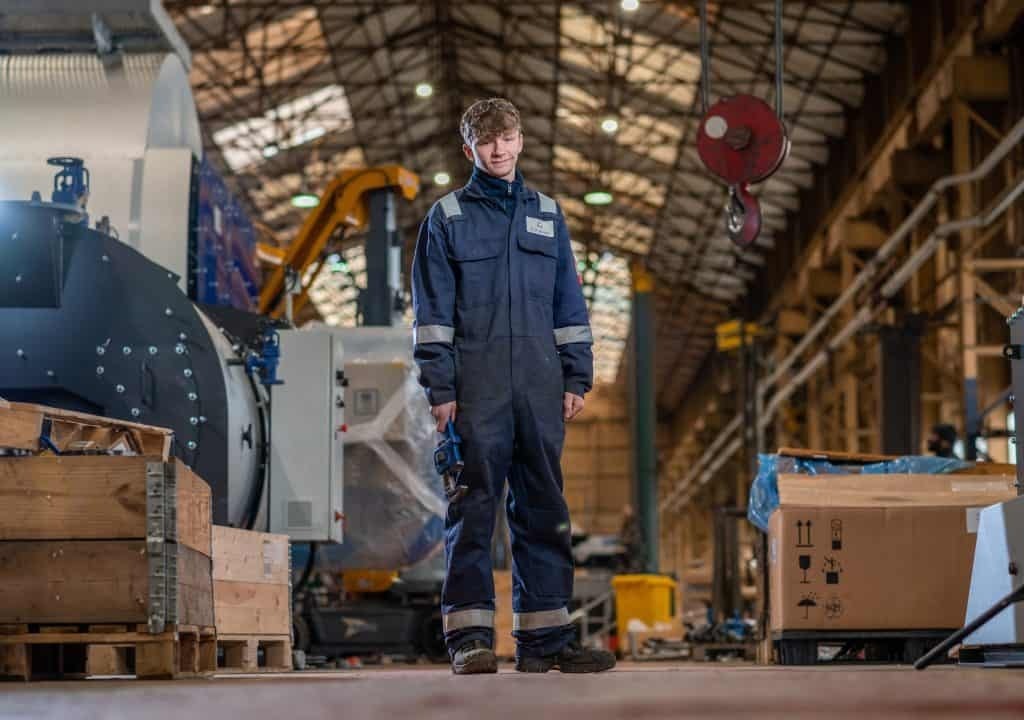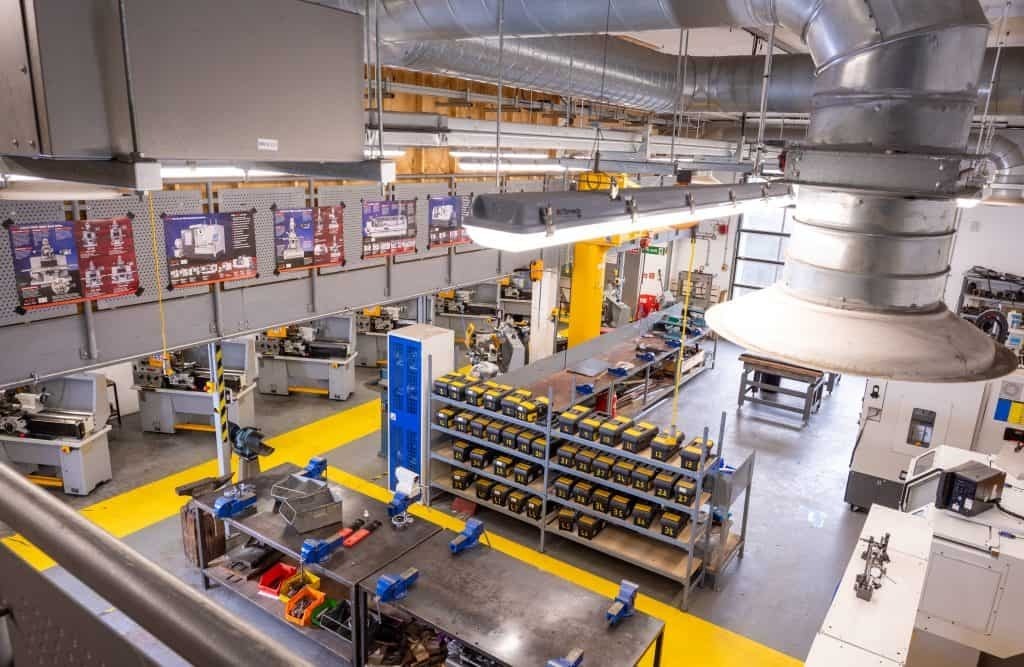Pave the way by solving problems and build your future by studying Engineering.
Get one step ahead and follow your passion towards an exciting industry with our engineering courses. With the latest technology, state-of-the-art equipment and our workshops will allow you to immerse yourself in the engineering environment.
What is Engineering?
The engineering industry turns ideas into reality using science and maths to create buildings and machines. A rewarding career path, each profession can be vastly different from manufacturing engineering creating equipment to civil engineering designing railways.
Affecting every aspect of our daily lives, studying engineering can help you understand how our towns and appliances work. From learning how to prototype designs in space engineering to working in solving agricultural problems this profession can take you anywhere.
Whether you’re looking into being self-employed, welding for a local company or working for a big corporation, engineering could be the career for you.
Chris Tait – Engineering Student
My apprenticeship allows me to earn an income whilst learning the key skills progress in my career.

Why study Engineering
With a varied job market studying Engineering you can become highly employable in many different sectors including construction, energy and software.
This gives you the opportunity to join the engineering industry at an exciting time learning new practical skills and gaining a highly sought-after qualification.
Get one step ahead in your career and make yourself an irresistible candidate for employers.
Study Engineering with us to enjoy:
- Access to world-class facilities – our workshops give you the opportunity to gain knowledge in a safe and welcoming environment.
- Support from highly-trained staff – our lecturing and professional engineering staff will help you learn the academic theory and the practical skills you need to get ahead and succeed.
- Have job security –The world depends on engineering to create and maintain structures and machines. This essential service is needed throughout our society with many companies relying on it to improve their products.
- A route to a viable career – with a qualification in engineering, you could go self-employed, work for a big corporation, work for a local company and beyond.
- Real-world skills – our courses are designed to provide you with the skills to be able to put them into practice, gaining real-world practical experience.
Where Engineering could take you
Take a look where a qualification in Engineering could take you.
Career Options
As more than 1 in 3 college leavers go on to find employment*, a qualification in Engineering could lead to the following careers:
- Civil Engineering Technicians – gives support to engineers in specialised areas on construction sites. This could be logistics, design or planning. Civil Engineering Technicians will have the knowledge and certainty to spot any problems that may occur on site and write reports for engineers. Average starting salary is between £17,000 – £19,000
- Energy Engineers – are involved in the production of harnessing energy. They often work with sustainable sources such as hydro, solar power, wind and biofuel. Energy Engineers can work with companies who remove oil and gas making them more economical, sustainable and help them meet carbon reduction targets. Energy Engineers will be confident people who can research and find locations of energy sites. Average starting salary between £20,000 – £30,000
- Wind Turbine Technicians – are responsible for maintaining and repairing wind turbines making sure they operate smoothly. They must have good knowledge of engineering, being able to install wind turbines at sea or on land. Wind Turbine Technicians are confident people who test turbine blades and control systems to make sure they are working correctly. Average starting salary £23,000 – £25,000
- Structural Engineers – are creative people who create and design buildings and structures which help solve problems. They can specialise in creating any venue or construction such as pipelines, schools, arenas and bridges. Structural Engineers will investigate the environmental conditions and how the project will be used to make sure it can endure any issues that may occur. Average starting salary between £22,000 – £25,000
Onward Study
As more than 1 in 3 college students who graduate with an HNC or above go on to university study*, a qualification in Engineering could lead you to the following degree options:
- Degree in Civil Engineering
- Degree in Sustainable Engineering
- Degree in Aerospace Engineering
*based on SFC College Leaver Destinations report 19-20
Professional Memberships
Students studying and graduates with a qualification in Engineering can become a member of the Institution of Engineering and Technology- the professional body for those working in the engineering industry.
Memberships offers you:
- Access to a well-respected network
- Ability to develop through ongoing learning
- Access to insights from the industry
- Opportunities to gain industry and professional recognition
- Develop your career
Course Entry Requirements
Despite being a very popular subject, the entry requirements to study Engineering can be relatively low. Specific requirements will vary by course, but we offer courses where no formal academic qualifications are required. For them, all we ask for is:
- You demonstrate a keen interest in studying Engineering with us
- You attend an entry interview and present yourself well
- You have a positive learner reference – if you’ve studied with us before.
For courses with formal academic entry requirements, we offer a number of routes in – from studying the qualifications that allow you to progress to offering alternative options.
All Courses
Choose the course for you and click through to find out more and apply:
-
Electrical Engineering HNC @ SCQF Level 7
-
Electrical Engineering HND @ SCQF Level 8
-
Electrical Engineering NC @ SCQF Level 6
-
Introduction to Engineering and Renewable Energy (NQ) @ SCQF Level 4
-
Introduction to Engineering and Renewable Energy (NQ) @ SCQF Level 4
-
Light Vehicle Maintenance and Repair Principles @ SCQF Level 5 (IMI)
-
Manufacturing Engineering NC @ SCQF Level 6
-
Mechanical Engineering HNC @ SCQF Level 7
-
Natural Power Wind Turbine Technician Trainee NC @ SCQF Level 6
-
Pre-Apprenticeship Electrical Engineering (NQ) @ SCQF Level 5
-
Pre-Apprenticeship Engineering Practice (NQ) @ SCQF Level 5
-
Transport Maintenance @ SCQF Level 4 (IMI)
-
BPEC ACS Gas Reassessment
-
BPEC Gas Foundation
-
BPEC Heat Pump Systems
-
BPEC Solar Thermal Domestic Hot Water Systems
-
BPEC Unvented Hot Water Systems
-
City & Guilds 2377-77 Level 3 Award in the In-Service Inspection and Testing of Electrical Equipment (PAT)
-
City & Guilds 2921-34 Design and Installation of Domestic and Small Commercial Electric Vehicle Charging Installations
-
Electrical Engineering HNC @ SCQF Level 7
-
GLOBAL WIND ORGANISATION (GWO): BASIC TECHNICAL TRAINING
-
Initial ACS Gas Training & Assessment
-
LPG Changeover – BPEC
-
Solar Photovoltaic Systems (BPEC)
-
Engineering Asset Lifecycle & Maintenance SCQF Level 7 (Modern Apprenticeship)
-
SVQ in Engineering Fabrication and Welding At SCQF Level 5
-
SVQ in Engineering Fabrication and Welding At SCQF Level 6
-
SVQ in Engineering Maintenance At SCQF Level 6
-
SVQ in Engineering Mechanical Manufacturing At SCQF Level 6
No courses currently listed
*Courses listed above are available as at time of publishing. Availability is subject to demand and some courses may stop accepting applications or be withdrawn at any time.
Zak Adams – Engineering Student
I like how hands on my apprenticeship is, it’s been the best way for me to learn.

Learning Environment
Our industry standard workshops give you the opportunity to thrive in an Engineering environment developing the skills and knowledge for your future career or further education.

With support from our qualified staff, they will help you learn about the different roles and the academic theory giving you the opportunity to succeed in your studies.
